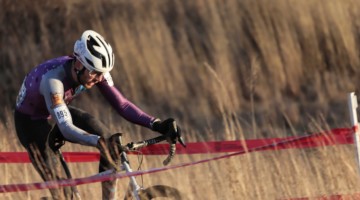Promoter Larry Grossman is fresh off of the announcer’s stand from this past weekend’s Cult Cross. After a well deserved rest, Larry has pulled together some thoughts on his most recent race and provides some good insight for others looking to pull off a grassroots race.
Grassroots: it’s a fantastic concept, and my number one priority as a race promoter in the small town of Eagle, Colorado. Cult Cross was initially brought to fruition on a long car ride back from Gunnison, Colorado. Courtney “WuzUp” Gregory and I discussed, without the full understanding of the logistics of actually putting on a race, how we could get more people to come to Eagle to race cyclocross. How in the world could we ever compete against the large front range (Boulder/Denver) cyclocross races in the fall? Two promoters had tried unsuccessfully in the past, as no one would drive over two passes to the mountains to race on the western slope of Colorado when they have a race in their backyards – just minutes away – every Saturday and Sunday during ‘cross season. And then somewhere between Salida and Leadville the thought occurred to me, what about a SPRING CX series? And so the journey began.
I found out quickly about barriers, and not just the variety on the course. You do not just “start” a cross series and show up and put on races. I explored several options. For one, I needed my races (the first year the series was three races) visible on a race calendar, and it needed to be a calendar that would be seen by every racer that raced cyclocross. I chose the ACA (American Cycling Association), as they were the sanctioning body for the majority of the races in Colorado, and I felt being on the ACA race calendar was a key to success. Well, that first year was a brutal realization.
I had two great venues, three really fun and challenging courses, but I had some major weather issues. Big snow storms kept the highway (I-70) from the front range mired in traffic problems, and many of the potential racers out there were still ripping powder on their fat skis as their number one priority. My racer numbers were pretty dismal that first year, but thanks to Brian Patrick from Onsight Media, Cyclocross Magazine and the local newspaper that I had informed about my races, we got some great coverage, which helped get the buzz out about Cult Cross 2008. My blog was getting a lot of traffic from people all over the world monitoring my spring attempt at cyclocross promotion, and the fifty t-shirts I made sold immediately. So I knew I had a brand and a cool concept, I just had to commit to the amount of work and expense it would take to do it again in 2009. My first year’s numbers were not a loss, but when I looked at the amount of time, effort and mental beating I took that first year, it was a tough commitment to make. And then I started having people ask me if Cult Cross was happening again 2009.
So the decision was made, by the racers. It was on.
2009 saw the Cult Cross racer numbers more than double, and I only did two races (compared to the total turnout from three races in ’08). Everything ran perfectly, the racers had fun and the sponsors stepped up to make the series a success. Unfortunately, I soon realized that to make the races profitable on such a small scale, there was only one way to do it. I had to rid myself of the ACA as a sanctioning body as the majority of any potential monetary profits were sucked up in fees, and there were extra headaches and time involved with doing everything by the ACA book (if you look at their process online, you’ll understand what I’m talking about).
The ACA serves a great purpose on the front range of Colorado. They provide EVERYTHING a race promoter needs to put on a great, well organized and safe event. They are extremely detail oriented. The problems for a small town race promoter, such as myself, are as follows, and this is a short list. First you must pay all the fees. These include but are not limited to being a member of an ACA registered club ($150 for the club), race day application fees, paying for officials and their travel expenses (thanks to Josh for doing it for next to nothing the first two years), and insurance fees based on the number of riders that actually race.
The other huge barrier for me was finding dates to do my races that did not conflict with other ACA races, as the ACA will not sanction two races on the same day, even if I’m located two to three hours away from the other race. This really put a bug up my ass, as most of the Cult Crossers were not racers that would head to the front range to race in the first place.
The ACA also has a promoters meeting every year, down in Denver or Boulder to discuss race dates and many other issues, this is a three hour drive for me, adding more expense to my promoting cause, and my races produce so little revenue for the ACA that I’m sure Cult Cross is way back on their priority list. More and more promoters on the front range of Colorado continue to cannibalize each other in their quest for revenue and they have begun to schedule races very early into spring and on every available date, which are often cancelled due to weather. There are so many options on the front range every weekend that you’ve really got to offer something different to draw anyone to come to your event. Spring cyclocross seems to have raised some eyebrows for the few in the Cult.
The bottom line was I had to find a way to break loose of any sanctioning body to make Cult Cross work, until the day when it is big enough to cover the exterior expenses that come with it. The final straw for Cult Cross came when I applied for five or six different dates to do my races on this year, early, and was denied all of them for an ACA sanctioned race. That was when I threw up my arms and said “screw it”. I needed insurance to run my race and could not find anything affordable to put on my race at the Eagle County Fairgrounds, a venue I feel is worthy of a National Championship event. Then a break, I got an e-mail from another friend who does some promotion in the Colorado High country with a lead on an insurance company and Cult Cross 2010 was on.
It was pretty late in the game at this point but I had the venue reserved and now I had insurance. I also had a bit of a following and some hard core racers I knew would spread the word, as well as the social networking skills to get the word rolling. Thanks to some fantastic sponsors I was able to minimize my costs, put on a really fun and challenging race, which included a men’s “A” race which featured Jake Wells battling Jay Henry for the title and I was able to actually make some money.
I minimized my brain damage by reducing Cult Cross to one race this year and we had great weather – cold temps, snow squalls and some heavy winds – making for a very crossy day. Racer numbers grew by about 20% without being on any race calendar from the previous year which was encouraging and racers came from as a far away as Provo, Utah to race – a six hour drive. I sold out of Cult Cross hoodies quickly on race day, and everyone digs the T-shirts. Cult Cross is a good thing, many racers have experienced cyclocross for the first time at Cult Cross and have enjoyed the race and the vibe and they want more and that is my goal. Of course, making a little bit of money to pay bills helps as well.
For a promoter facing many of these same challenges I’d suggest to try and do your own thing if you’ve got a good sphere of cycling people. You will have to do most of the work yourself, for a while. In my case I actually set course (find a venue that does not care if you ruin the grass!) three days out, get volunteers to help with day of registration, bring my own PA system, DJ and announce myself, and score the race the best I can WHILE announcing. I try to keep placing fairly accurate which can be challenging, but I want people to come and race Cult Cross for the fun factor and the vibe. No agro attitudes at Cult Cross please. No worry about BAR/BAT points. Just come and ride a fun course and have a good time with good people. The only result that matters at Cult Cross is that you end up having a quality day with quality people, that’s it, keep it simple, like I have decided to do. Perhaps one day we will be a big time event on the big time calendar, but I’m not sure that is where Cult Cross belongs, we like being called grassroots, that has great value in our small community, 2011 will bring another great event, and we hope you come check us out.
Stay tuned to the blog for next year’s details and feel free to join the Cult Cross Facebook group as well for updates. Come “Suffer in the spring as you do in the fall” and “run to the grave one barrier at a time”!






























